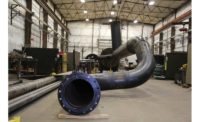Many reasons can explain why Indianapolis-based electrical contractor ERMCO Inc. has emerged as the go-to firm for high-wattage projects in the region, but Greg Gossett, the firm's vice president of operations, says rocket science isn't among them.
"It's just pipe and wire," says Gossett. "For us, it's more a matter of figuring out what we can do to be as efficient as possible, from bidding all the way through close-out."
On projects ranging from airports and palladiums to Indianapolis' Eskenazi Health Hospital, a $620-million, 1.2-million-sq-ft facility due for completion this year, foremen don't spend time contending with multiple deliveries multiple times per day. As a result of a preferred vendor partnership ERMCO has struck with suppliers Graybar and Wesco, firms with which it shares an address, deliveries are coordinated and grouped to order. "They're no longer just commodities—we're long past that. They're our service partners," says Darrell Gossett, Greg's brother and president of the family-owned company. "The only way we're going to make money is if we minimize non-productive work."
Accordingly, entire electrical closets arrive on project sites prebuilt, ready for installation once stud walls have been erected. Likewise, control panels, racks, raceways, cable trays, ductwork, panel tubs and mounted transformers all are prefabricated in the firm's 15,000-sq-ft service center.
"If a job requires us to perform a task more than once, chances are we're going to want to prefabricate," says David Peterson, ERMCO senior vice president of business development.
"Other contractors regard prefabrication as boxes and whips," adds Greg. "Not us. We don't see any limit to what we can prefabricate, our goal being to ship the best product possible into the field in terms of schedule, quality, cost and safety. Otherwise our customers won't support it. We won't support it."
The firm is equally adept at deploying manpower. Each year, it plucks 18 mechanics from its ranks and enrolls them in an in-house, 18-week program known as Leadership Awareness Training Class. "Candidates need to be good technicians but also demonstrate leadership potential, which is why they must be recommended by a project manager or seasoned foreman," says Greg.
Once enrolled, mechanics are schooled in construction contracts, collective-bargaining agreements, time management, safety, business development and the firm's tool and prefabrication business. Participants additionally undergo a two-session personality assessment. "If you understand what drives you, you're going to have a better understanding of how to connect with others," Greg says.
Upon completion of the program, participants emerge as field leaders, equipped to assist in the oversight of the large, complex projects that have become the firm's bread and butter. "It's really those field leaders that allow us to manage projects like Eskenazi," says Greg. "And those projects provide experience they can take with them to the next big project.'
Situated on a 37-acre site and comprising 12-story and six-story structures, Eskenazi alone required the installation of 22,500 outlets and switches, 30,000 light fixtures and five 2500-kW emergency generators.












